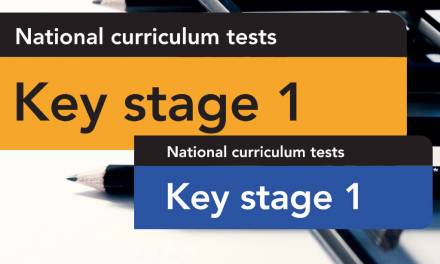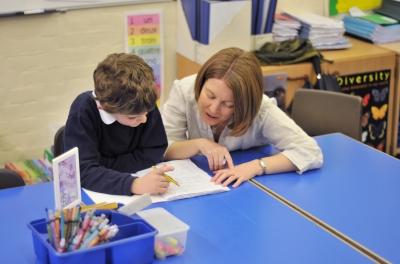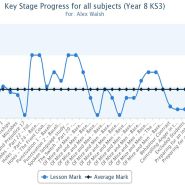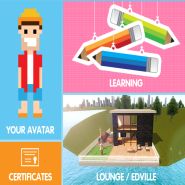
News
RECOMMENDED
How to support a child with ADHD in education
Reading time: 4 minutes
Attention deficit hyperactivity disorder (ADHD) can be a complex neurodivergent challenge that children present to parents and teachers. It’s important to understand their needs and accommodate what suits them so they can achieve the best experiences and outcomes.
EDClass spoke to the founder and CEO of ADHD Advocate, Stephanie Camilleri to discuss the challenges of ADHD and what strategies we can implement to overcome certain barriers. Stephanie was a former lawyer and transitioned to educating and inspiring about ADHD following the diagnosis of her daughter and herself.
Read More5 benefits of online learning for off-site direction
Reading time: 3 minutes
The education sector is evolving and adapting to accommodate the specific needs of students. These students with medical, behavioural or mental health challenges need a solution that can allow them to thrive and reach their education potential.
Off-site direction is used to support students with primarily behavioural challenges that are hindering their academic progress and personal development. Could an online or hybrid approach be more suited to these types of learners so they can focus their attention on their education?
Read MoreSuccess of online AP with Rodillian Academy
Reading time: 4 minutes
Implementing a successful online alternative provision can be achieved if due diligence checks are completed by a school to ensure the provision provides high-quality education.
EDClass had the privilege of speaking to the head of year 7, David Paul from Rodillian Academy, to discuss how they have successfully implemented the EDClass platform. David also highlighted key areas and challenges that are currently present in the education sector that need addressing.
Read MoreCovid support for students how much longer should it continue?
Reading time: 3 minutes
Covid had a significant impact on children’s education with a huge amount of lost learning occurring. Recent news has highlighted that GCSE students will get additional support during their exams. The BBC News stated:
“GCSE students in England will get formulae and equations in their maths and science exams under plans to limit the impact of Covid.”
This has raised the debate as to whether this support should continue to alleviate the learning gaps caused by the pandemic or whether this could diminish a student’s true understanding of their knowledge on certain topics.
Read MoreSchools Bill scrapped – how can students be helped?
Reading time: 3 minutes
The Schools Bill, designed to improve education standards, has been scrapped potentially leading to more implications. What can be done to help support schools and students now whilst other plans are drawn up?
The Bill, which derived from The Schools White Paper in March, supposedly hit several obstacles and 18 clauses were removed relating to academies and regulations, ultimately leading to its dismissal.
Read MoreGovernment shift improves education for 22/23?
Reading time: 4 minutes
Following the recent shake-up within the UK government, the impact it could have on the education sector could be massive. What does this mean for the education sector, alternative provisions and what needs to be done to improve standards for the 2022/23 academic year?
Prime Minister Boris Johnson recently announced his resignation but will remain as caretaker PM until a new leader has been chosen. Following several candidates vying for the position, it now looks as though “either Rishi Sunak or Liz Truss will become the UK’s next prime minister”.– BBC
Read MoreMy End Point Assessment with EDLounge
Reading time: 2 minutes
I started my Business Admin Level 3 apprenticeship with EDLounge in October 2020. After nearly 18 months of my apprenticeship, I can now say that I have completed my apprenticeship with a PASS grade!
When conducting my End Point Assessment, I have received enormous support from the tutors at EDLounge. I felt confident I would pass as my tutor has gone through every stage of my Gateway and EPA in great detail. They ensured I understood what will be asked from me and answered any questions or worries I had at the time. The staff at EDLounge always made it clear that I can always contact them if I was struggling with my apprenticeship.
Read MoreMy Junior Content Producer Apprenticeship with EDLounge
Reading time: 2 minutes
I am doing a Level 3 Junior Content Producer apprenticeship with EDLounge and I am working with EDClass, their sister company that takes on apprentices. I have been here since 15th February 2022 so not very long, but it will take me 18 months to complete my apprenticeship.
Read MoreMy Business Admin Apprenticeship with EDlounge
Reading time: 3 minutes
I have recently completed my level 3 Business Admin apprenticeship with EDLounge. I started working for EDClass in October 2020 and I have been here for just over a year. On average it takes 12 to 18 months to complete this apprenticeship, and I am extremely happy with how it was conducted and I am over the moon that I now have a qualification in Business Admin!
Read MoreMy Team Leader & Supervisor Apprenticeship with EDlounge
Reading time: < 1 minute
My name is Amelia and I completed my Level 3 Team Leader/Supervisor apprenticeship with EDLounge in January 2022. I started my apprenticeship in October 2020, therefore I was doing the apprenticeship for 16 months. I decided to start this apprenticeship as I wanted to upskill and become the manager of the School Account Managers team. It had been nearly 2 years since I completed my Business Administrator apprenticeship and I felt it was about time I started another.
Read MoreMy Team Leader apprenticeship with EDLounge
Reading time: 2 minutes
My name is Archie Dickens and I am currently on a Level 3 Team Leader and Supervisor apprenticeship with EDLounge. I started this apprenticeship with EDLounge on the 4th of May 2021. I have a maximum of 18 months to complete the apprenticeship and I am making good progress towards my end point assessment.
I first started working for EDClass in 2017 when I took the decision to drop out of the sixth form as I realised that it wasn’t for me. I was never the most academic person within the school and I thought that getting myself into the world of work would be the best route to take.
Read MoreNew education white paper – will it be met?
Reading time: 3 minutes
The recent release of the ‘Opportunity for all’ schools white paper has raised some queries and its benefits. Let’s discuss.
Read MoreMy Software Tester Apprenticeship with EDLounge
Reading time: 4 minutes
The apprenticeship is done through EDLounge and work is done through EDClass. I had officially started the apprenticeship on the 31st of January though I have been with EDClass for a short period before, as the company very kindly offered a trial to ensure this position was the right one for me. I am expected to complete the apprenticeship within the next two years.
Read MoreMy Digital Marketing Apprenticeship with EDLounge
Reading time: 6 minutes
I am doing a Level 3 Digital Marketing apprenticeship with EDLounge, working for EDClass. I started my apprenticeship on the 2nd November 2020 and have been doing it for around 16 months now.
On average it takes between 12-18 months to complete an apprenticeship so I am now coming towards the end, preparing to submit my EPA (end point assessment) which will be the final part of my apprenticeship.
Read MoreCan the education sector do more to help students?
Reading time: 3 minutes
With Covid restrictions practically ceasing to exist from 21st March, how are students being further supported with their education, can more be done and how can EdTech now assist?
Read MoreEdTech – How to choose the best platform
Reading time: 3 minutes
Choosing the best EdTech platform can result in undertaking in-depth analysis and research before choosing the most suitable platform for your school. Here’s some solid advice if you’re currently searching for a solution.
Read MoreAir purifiers: Are they effective for schools?
Reading time: 2 minutesThe government has provided air purifiers for schools, but has it been...
Read MoreWhy Apprenticeships can be more beneficial than University
Reading time: 3 minutes
At 18 years old, young people who want to stay in education have a huge choice to make: University or Apprenticeship. How do apprenticeships differ from university, and can they be better in some cases?
Read MoreWhy Online Education Can Help Mental Health
Reading time: 3 minutes
Mental health issues may have increased in young people during the pandemic but online learning can help. How can online education benefit students’ lives?
Read MoreWhy safeguarding in summer holidays needs priority
Reading time: 3 minutes
Safeguarding students during the summer holidays is crucial and online learning can effectively help when delivered properly.
Read MoreData breaches in education – why it’s crucial to protect personal information
Reading time: 3 minutes
Data, privacy and safeguarding issues have become a worry since the pandemic began, but could these issues have been dealt with better?
Read MoreEDTech – 5 ways EDClass can help with your teaching and learning
Reading time: 4 minutes
EDTech has proved to be a great asset in providing teaching and learning over the past year. EDClass has taken it to another level.
Read MoreOnline Education and Summer Schools’ potential to retain lost knowledge for students
Reading time: 5 minutes
Online education and the recent proposed summer schools have the potential to help retain lost knowledge.
Read MorePlatform updated to support the ‘catch up’ generation with built-in live learning
Reading time: 3 minutes
EDClass, a pioneering British edtech company founded back in 2008, has today announced an update to its platform aimed at helping children catch up with lost learning due to the pandemic.
Read MoreDepartment for Education warns of insufficient high-quality teachers
Reading time: 3 minutes
High-quality teachers are in short supply, according to the Department for Education’s annual report.
An “insufficient number of high-quality teachers” is likely to result “in poor educational outcomes for pupils”, it believes.
The report says that although action is being taken, this issue remains a “high risk” to the Government’s objective that all children and young people will have access to high-quality education.
Access to high-quality education has been worsened during the coronavirus pandemic due to issues such as digital poverty. This blog post explains the findings of the report.
Read MoreOffering a Continuous Curriculum delivery
Reading time: 2 minutes
The last thing that teachers want to see this year is another interrupted school year.
Having a continuous curriculum in place ensures that learning doesn’t stop in the event of a local lockdown or school closure.
This blog post is all you need to know about offering a continuous curriculum delivery.
Read MoreWe’re becoming EDClass
Reading time: 2 minutes
This month you will notice some changes to the communication you receive from us: as our alternative provision business will become EDClass.
In this blog post we’ll explain what this means and what EDLounge will become.
To find out more about what the decision to move from EDLounge to EDClass means for you, call 01909 568338.
Read MoreThe EDLounge team is here to help with school reopening
Reading time: 3 minutes
Today was school reopening day as some pupils in ‘critical year groups‘ returned to the classroom.
‘Early years students’ were deemed most critical and resume education from today. Some secondary school pupils will also return to the classroom during June as the threat of coronavirus declines.
EDLounge also chose today to return staff to their headquarters following a time working from home. This means we are well equipped to help you with your transition back to school life.
Here is an update from a busy day in education.
Read MoreEDLounge: working from home (the story so far)
Reading time: 2 minutes
The UK lockdown began on the evening of 23 March, with EDLounge staff working from home the following day.
The senior leadership team had worked hard in order to make it possible that this could be done. Laptops and desktop PCs were distributed to staff in the days prior to lockdown being introduced.
But what was asked of the team and how had staff adapted to working under lockdown?
Read MoreCuriouser and Curiouser (Some thoughts from an English teacher…)
Reading time: 3 minutes
In the short space of a phone call with my brother last night, three more emails landed, subject: ‘Update from GOV.UK – Covid-19’. Each one means more legislation. More rules. Each one makes you think what else can’t we do? Is there much left we can do?
And yet, curiously, there’s also the sense that the ‘rules’ that keep us sane and grounded are ‘out of the window’ – as was I, at eight o’clock last night, for example. We do things we didn’t do before, and can’t do things we took for granted before. The old order of things is becoming obsolete as we adapt to new behaviours, and the burning questions are ‘When will we return to normal?’ and ‘What will the new normal be like?’.
Read MoreBalancing work and home when you work from home
Reading time: 3 minutes
We knew it was coming. It had been weeks in the planning. Sam has spent last weekend creating various Skype groups (including one for “General Chit Chat”) to ensure all eventualities were covered.
On Monday, we had an all-staff meeting to discuss how it was going to work. From Tuesday we would be working from home.
Read MoreWe’re supporting a range of UK charities
Reading time: 2 minutes
We’ve teamed up with a number of UK charities to offer support to them, whilst also providing an education for primary school pupils.
This week we’ve agreed to donate £1 to every £3 subscription with charities including the Bradley Lowery Foundation and Bluebell Wood Children’s Hospice.
If your club or organisation are looking to raise much needed funds, we can provide you with your own promotional code – supporting education whilst helping your club or local charity. In this blog post we’ll explain how this works and tell you about the charities we are supporting.
Read MoreSixth form college strike: how education can avoid being affected
Reading time: 3 minutes
Starting this week, sixth form college staff will participate in three strikes in protest against government funding cuts.
National Education Union (NEU) members from 34 sixth form colleges will be taking strike action. The first strike took place on Wednesday, with action also scheduled for 27th February and 10th March. The action in February includes a rally in central London.
The action will affect schools and have implications on the education pupils are receiving. But how can a school minimise the effect a strike may have on its learners? And how can online learning be used to benefit pupils in the absence of classroom time?
Read MoreSubcontracting consultation: ESFA proposal to limit long-distance subcontractors
Reading time: 3 minutes
The Education and Skills Funding Agency (ESFA) has launched a subcontracting consultation, with plans to cap business spending and ensure only local or digital consultants are used by contractors.
The ESFA has issued ten recommendations on changes to subcontracting rules – with the aims of reducing costs and eliminating poor arrangements. If you are a provider or subcontractor, please read the information below.
Read MoreBETT Show Review 2020
Reading time: 3 minutes
Thank you for visiting us at the BETT Show 2020, the largest education show in the UK with 34,000 attendees.
The EDLounge and EDArcade stands were extremely busy throughout the four days, with hundreds of people grasping the opportunity to see the products first-hand.
Read MoreEDVille: our educational games app is free for the duration of the BETT Show
Reading time: 3 minutes
Our educational games app, EDVille, is free for the duration of the BETT Show which takes place on 22-25 January 2020.
Read MoreCompetition: win a free arcade machine when you order EDArcade
Reading time: 2 minutes
EDArcade is exhibiting at the BETT Show on 22-25 January.
Ahead of the show we can reveal a new competition: we are giving one lucky winner the chance to win a free arcade machine when they order EDArcade before or during the show.
Read MoreEDLounge is exhibiting at The BETT Show 2020
Reading time: 5 minutes
EDLounge Ltd is exhibiting at the BETT Show – one of the largest educational shows worldwide with 34,000 annual visitors across the education sector.
It takes place at the London Excel between 22-25 January and you can read more about it here.
Read MoreSupport our children as they tackle the climate crisis
Reading time: 2 minutes
Many of you will have seen pupils participate in climate crisis strike activities last Friday, deciding to get their education that day from a source other than the classroom.
Dropping into the Sheffield rally, I remarked to myself what a live educational experience this was.
Read MoreStudent activism – should it be encouraged?
Reading time: 2 minutes
The 15th of February marked a turning point in modern student activism, with an estimated 15,000 pupils skipping school to attend climate protests across the UK.
And thousands of children across the world are expected to walk out of their classrooms today to bring more attention to the global climate crisis.
Read MoreCan virtual classrooms offer support for students with mental health issues?
Reading time: 2 minutes
Mental health is increasingly recognised as a problem for pupils of any age. A 2015 report by the Mental Health Foundation highlighted figures from previous ONS research that suggested 10% of children and young people between 5 and 16 have a diagnosable mental health problem.
Read MoreTeacher retention: what can school leaders do to keep their best teachers?
Reading time: 4 minutes
It’s official. We’ve hit the highest teacher leaving rate in a decade and there still doesn’t seem to be a solution to the problem of teacher retention.
Four in ten teachers quit within a year, while almost half of UK teaching staff plan to leave the sector in the coming five years.
Read MoreHas racism in the classroom become more prevalent since the Brexit referendum?
Reading time: 2 minutes
In the immediate months following the EU referendum occurrences of racially or religiously aggravated crimes soared – in July 2016 alone police witnessed a 41% increase as compared to the year before.
If racist crimes (including assault and arson) continue to take place on the streets of Britain, seemingly perpetrated by individuals against complete strangers, it’s more than relevant to question whether racism in the classroom is also on the rise.
Read MoreKS1 SATs could be replaced by assessments. Is this a good idea?
Reading time: 2 minutes
At the end of March, 2017, the government announced that they were looking to replace KS1 SATs with teacher assessments.
For years, teachers and parents alike have been pressuring the government to scrap SATs for seven-year-olds because they felt that these tests placed unnecessary stress on everyone involved, and were not reliable indicators of a student’s ability.
Read MoreThe new GCSE grade scale: what does the change to 1-9 mean?
Reading time: 2 minutes
As is commonplace for those in the education system, the past 24 months have marked much change, not least of which is the new GCSE grade scale.
Teachers, parents and pupils alike have faced a transition from the old scale of U – A*, to U to 9. Let’s explore what this change means and why it has been put in place.
Read MoreDoes Progress 8 help vocational learners?
Reading time: 2 minutes
Progress 8 was launched amid a flurry of educational sector changes; for years, teachers and school management have done battle with all sorts of metrics, and the balance between the focus on grades and what’s best for the pupil.
There were positive expectations when Progress 8 was introduced back in August 2016. Some seven months on, we look at what this change has meant for the educational sector, and moreover, what it has meant for vocational learners who had previously been relatively overlooked by the old system.
Read MoreIn the news: 5 EBacc GCSEs to be studied by all pupils
Reading time: < 1 minute
Yesterday, news emerged on the plans due to be put forward by Nick Gibb, schools minister, that all secondary school pupils in England will be expected to take five GCSEs in EBacc subjects: English, maths, science, a language and history or geography.
The Conservatives’ election manifesto stated that if schools did not offer these, they would not be eligible for a top Ofsted rating (BBC).
Read MoreSnow Days
Reading time: < 1 minute
With parts of England and Wales experiencing snow and icy conditions over the past few days, we look at the effect of snow days on learning and teaching.
The decision to close a school due to severe weather conditions such as snow is never taken lightly. The DfE advises that schools should stay open as long as possible, although closing may be necessary if safety is at risk. Ultimately, the decision lies with the head teacher, with the aim of reopening as soon as possible if the decision is to close.
Read MoreReflecting on Teaching Practice
Reading time: 3 minutes
Reflective practice within teaching centres around activity which takes place in the classroom, the thought processes around why things take place and then considering if it is all working as it should be.
Reflecting on your teaching means you are undertaking self-observation along with self-evaluation and is important because we can identify the kind of practices we undertake, analyse the beliefs in how we teach and evaluate the overall situation with an outcome as to any changes which are needed or improvements in the way we teach.
Read MoreBlended Learning
Reading time: 3 minutes
“By 2019, 50% of all high school courses will be delivered online” forecasts American writer of Disrupting Class book Clayton Christensen.
His prediction refers to schooling in the USA, but could the UK education system follow suit?
Online learning is a fundamental cornerstone to the model of blended learning; one which is growing at speed for those in the lifelong learning as they combine busy lifestyles with a return to study and one which is bound to factor in secondary and primary curriculums to a greater degree as schools embrace modern technology as educational tools.
Read MoreDigital Literacy
Reading time: 3 minutes
Digital literacy is now a cornerstone key skill for many careers and there is a growing impetus for it to be recognised as being as important as being able to read and write to a level where it felt that it is a comprehensively gained life skill.
In the past, digital literacy was known generically as ICT and was originally untested. It did not sit alongside the core subjects of English, maths and science and was often based around learning packages such as Microsoft Office or activities which included internet browsing or gaming.
Read MoreEDLounge Case Study
Reading time: 2 minutes
The Rodillian Academy and EDLounge came together in September 2013 to look at how we could improve our existing online provision. This needed to meet national guidance on the use of alternative provision and, more importantly, provide high quality, appropriate work for students who were not accessing mainstream education for a fixed period of time.
We have developed a unique package to support students who are out of mainstream education, providing them with appropriate, accessible work that is accessed through a secure online platform.
Read MoreWhat will the SEN Reformations mean for you?
Reading time: 3 minutes
Our attitude to SEN has always been the same: more should be done. With the government’s reformations due to be implemented in September, we look at what the changes will mean.
You only need to hear two words to incite a wince on most of our faces: government reformation. The pending reformation in the way SEN support is delivered in schools and colleges in England is no exception; bringing with it confusion for parents, young people, teachers and other education, health and care practitioners.
Read MoreWhat’s in a name? The “Sir” and “Miss” debate
Reading time: 2 minutes
The debate causing a stir at the moment is whether addressing teachers as “Sir” and “Miss” is sexist.
Professor Jennifer Coates sparked yesterday’s debate as she told the Times Educational Supplement that “Sir is a knight…but Miss is ridiculous – it doesn’t match Sir at all.”
One solution to this problem that has been highlighted is the idea that teachers could be addressed by their first names. This has been met with a tone of disapproval among some, including chief executive of the Girls’ Day School Trust, Helen Fraser.
Read MoreLearning Outside the Classroom
Reading time: 2 minutes
How often do you take lessons outside? The benefits of taking pupils outside the classroom to learn are well documented, with research conducted by Ofsted outlining advantages such as making subjects more vivid and interesting for pupils, enhancing their understanding, and developing pupils’ personal, social and emotional development. (Learning Outside the Classroom, 2008)
Read MoreHow should we cater for different learning styles?
Reading time: 2 minutes
I have recently been conducting some research around innovation in education. With ever-advancing technology, there seems to be new ideas cropping up daily which would be fantastic to utilise for education, whether it is in the classroom or for individual study.
Read MoreAre you ready for assessment without levels?
Reading time: 3 minutes
September 2014 sees a major shakeup in the secondary school curriculum and assessment methods – and the indications are that many schools are still not fully prepared.
Admittedly, there has not been a great deal of time. It was only in June last year that the Secretary of State for Education, Michael Gove, dropped his bombshell.
He announced at the NCTL ‘Seizing Success’ conference that the new National Curriculum to be introduced in September 2014 would not involve existing National Curriculum assessment levels.
Read MoreCreativity in the classroom
Reading time: < 1 minute
During World Creativity and Innovation Week April 15 – 21 people are acknowledged, informed, inspired and encouraged to use their creativity – to be open to and generate new ideas, to be open to and make new decisions and to be open to and take new actions – that make the world a better place and to make their place in the world better too.
Read MoreCareers guidance in schools
Reading time: 2 minutes
The Department for Education has today published the revised ‘Careers guidance and inspiration in schools’ statutory and non-statutory guidelines. The documents are for governing bodies, school leaders, school staff in maintained schools, local authorities that maintain PRUs, academies and free schools.
Read MoreConversation launched for new GCSEs
Reading time: 2 minutes
Last week saw the news that Ofqual had “launched a conversation with the public on how standards should be set for new GCSEs.” The new GCSE shake-up will include the replacement of A-C grades with a 1-9 numbered scale, with 1 for the lowest performers and 9 for the top performers; thought to be “awarded to only half the pupils now achieving an A*” (BBC, 2014).
Read MoreGet Young People Writing
Reading time: 2 minutes
Over the past few weeks there have been several national days and weeks to promote reading, such as World Book Day. There are still more of these to come in the form of International Children’s Book Day (2nd April).
These have been great ways for schools to encourage their pupils to read for pleasure and share their views and opinions of the books they read. This has been achieved in several forms, such as dressing as their favourite book character.
Read MoreProgress 8
Reading time: < 1 minute
In 2016, Progress 8 will be introduced into all schools. Schools will also be able to opt-in one year early to the new accountability system.
Progress 8 captures the progress a pupil makes from the end of primary school to the end of key stage 4 (KS4). Progress 8 is a type of value added measure, which means that pupils’ results at the end of KS4 are compared to the actual achievements of other pupils with the same prior attainment. Progress 8 will be used as the floor standard measure. (DfE Progress 8 measure in 2016)
Read MoreWorld Meteorological Day 2014
Reading time: < 1 minute
World Meteorological Day 2014’s “theme is ‘Weather and climate: engaging youth.’ Today’s youth will benefit from the dramatic advances being made in our ability to understand and forecast the Earth’s weather and climate. At the same time, most of them will live into the second half of this century and experience the increasing impacts of global warming. WMO encourages young people to learn more about our weather and climate system and to contribute to action on climate change” (World Meteorological Organization).
Read MoreWorld Book Day 2014
Reading time: 2 minutes
Last month we took a look at how the art of storytelling could be used in the classroom, as inspired by National Storytelling Week.
We have another great reason to look towards the educational opportunities to be found in the world of literature tomorrow in the form of World Book Day. This yearly event is another fantastic initiative to promote a love of reading in both primary and secondary schools: “It’s a celebration of authors, illustrators, books and (most importantly) it’s a celebration of reading.”
Read MoreNational Apprenticeship Week
Reading time: 2 minutes
National Apprenticeship Week (3-7 March) “is the time when all eyes are on Apprenticeships and it’s all about raising the profile amongst employers, individuals, teachers, parents and the media.” We therefore thought we would take a look at the advantages and disadvantages of apprenticeships, so that we can give the best advice to our pupils when they are considering their options once they have left school.
Read MoreGame-based learning
Reading time: 3 minutes
How can the use of digital games in the classroom support children and young people’s learning?
As increasing numbers of 8-18-year-olds participate in gaming, so has interest in the identification and harnessing of its potential to support learning in schools. EDLounge takes a look at the key findings.
Read MoreAdvice for parents
Reading time: < 1 minute
Advice for parents has been issued today from the NAHT and the charity Family Action through their joint campaign Ready to Learn Every Day.
The information leaflet will be distributed through the NAHT members’ schools and is thought to reach “85 per cent of primary schools and almost half of secondaries” (The Telegraph, Feb 2014).
Read MoreAssessment without levels
Reading time: 2 minutes
Yesterday the NAHT released their commission on the removal of National Curriculum levels which will come into effect in September. The release of the commission’s report is to “establish an independent commission on ‘assessment without levels’ to consider what lay behind good assessment and to look for examples of good practice already in place or developing in schools.”
Read MoreThe Longer School Day Debate
Reading time: 2 minutes
The longer school day debate has been high in the news this week with Michael Gove’s proposal of a 10-hour school day and shorter school holidays.
Those in favour of the extended school day state that it will benefit all involved: parents will be able to work full time without extortionate childcare costs and the children will benefit as they will receive a more well-rounded education including extra-curricular activities.
Read MoreNational Storytelling Week
Reading time: 2 minutes
“National Storytelling Week is about giving out to all cultures, tales that give a twinkle to the eye, that raise a question in the mind and stories that have survived the brightness and the shadow of man’s imagination.” (Society for Storytelling, 2014)
Read MoreThe GCSE gender gap
Reading time: 2 minutes
Last week The Independent revealed that “Girls lack confidence in their ability in maths and science and are therefore put off from applying for jobs in engineering and computing” (The Independent, January 2014).
Every year the GCSE gender gap in school subjects is brought into the spotlight, with an attempt to analyse the cause of this division.
Read MoreParents fined for lateness
Reading time: 2 minutes
A school in Milton Keynes has caused debate today as they have warned parents that they will be implementing a fine if their children are late for school 10 times in a 12 week term (BBC, Jan 2014).
I think it is important that cases should be individually reviewed, identifying any underlying causes that are preventing pupils arriving to school on time. Some pupils may have extenuating circumstances and this should be taken into consideration when implementing any kind of penalty system. This includes providing help for pupils and their families to combat any intrinsic problems that are having this effect on the pupil’s education.
Read MoreRewards and sanctions – what works?
Reading time: 3 minutes
In the November issue of ED Journal, we discussed strategies to manage low level behaviour issues in the classroom. Balancing positive and negative was one of the key points mentioned, so in this issue we are going to look at how schools run rewards and sanctions and more importantly, discuss what actually works and what pupils perceive to be effective rewards and sanctions.
Read More

















































































